- Home
- Lise McClendon
The Things We Said Today
The Things We Said Today Read online
The Things We Said Today
a Bennett Sisters Mystery
Lise McClendon
Thalia Press
Contents
The Things We Said Today
Two Families and a House
Chapter 1
Chapter 2
Chapter 3
Chapter 4
Chapter 5
Chapter 6
Chapter 7
Chapter 8
Chapter 9
Chapter 10
Chapter 11
Chapter 12
Chapter 13
Chapter 14
Chapter 15
Chapter 16
Chapter 17
Chapter 18
Chapter 19
Chapter 20
Chapter 21
Chapter 22
Chapter 23
Chapter 24
Chapter 25
Chapter 26
Chapter 27
Chapter 28
Chapter 29
Chapter 30
Chapter 31
Chapter 32
Chapter 33
Chapter 34
Chapter 35
Chapter 36
Chapter 37
Chapter 38
Chapter 39
Epilogue
Keep in touch
About the Author
Also by Lise McClendon
The Things We Said Today
a Bennett Sisters Mystery
* * *
Lise McClendon
Lise McClendon, 2016
* * *
Published by Thalia Press, USA
All rights reserved. No portion of this work may be copied without express permission of the publisher, except for bonafide reviews.
Two Families and a House
Bennett Family
Jack + Bernadette
The Sisters:
Annie — engaged to Callum Logan
Stasia — married to Rick. Daughter, Willow. Son, Oliver.
Merle — son, Tristan. Boyfriend, Pascal d’Onscon
Francie — divorced
Elise — single
* * *
Logan Family
Fiona — widow of Lyle Logan
The Brothers:
Hugh — married to Davina
Callum — engaged to Annie Bennett
* * *
House guest: Bruno Nordvilles-Moura — business acquaintance of Hugh
* * *
Kincardie House
Jinty Arbuckle, caretaker
Vanora Petrie, housekeeper
Mrs. MacKeegan, cook
Killian Yarrow, chauffeur
Brian Gunn, “Gunni”, sheep man
Craigg, retired caretaker/sheep man
1
Northeast Coast of Scotland
The Scottish landscape sped by the window in flashes of greens, ruby reds, and golds as Merle Bennett sat curled into the train seat, holding Pascal’s warm hand. All the planning, coordinating, and anxiety of the last few months evaporated as they passed fields of sheep, horses grazing on emerald pastures, trees aglow with new finery, and tiny villages squatting low along roadsides.
As a pessimist Merle never thought it could all come together, even with her prodigious check-lists. But you are subject to pleasant surprises as a pessimist, and Merle was experiencing one right now. Things had come together. Stasia, the hyper-organized sister, had wielded her mighty binder full of maps, weather charts, and suitcase-packing diagrams. Merle had provided lists of clothing by day of the week. Annie, the eldest and the bride, had floated along on everyone else’s plans. The younger sisters were blissfully ignorant of all lists, treating the whole thing as a big adventure. And it was, Merle supposed, if you looked beyond the machinations to make it all happen.
Annie’s wedding was in five days. Merle was crazy about Callum Logan, as he made her sister happy. That was easy to see. But it would be stretching it to say that she thought six months ago that this wedding would happen. Moving entire families across the Atlantic Ocean, coordinating flights, getting passports for some, renewals for others, hotel rooms, rental cars, all that plus the actual wedding planning. Not to mention trying to make everyone happy. It was a nightmare to Merle. In the end she only had to coordinate herself and Pascal. And that, as it turned out, was easy.
He had his head back, eyes shut, black curl drooping on his forehead. The sway of trains made most people sleepy but Merle rode one almost every day. She rubbed the back of his hand with her thumb. Almost everything about Pascal was easy, she thought, and that made her twitchy. Life in general didn’t fit that pattern. There were compromises and disappointments, failures and chaos. People left you, grew up, moved away, died. There was so much room for loneliness and disaster.
Life was irritatingly random. So she made her lists, trying to control what she could and cross the rest off.
They slowed to a stop in a small town. The station was bright, cheerful, with splashes of blue paint. Sunshine poured through glass panels in the roof. Everything she’d heard about Scotland seemed wrong. It was beautiful, peaceful, full of spring flowers, blue skies, and happy faces.
She made a quick promise to herself to smile all week. Her son Tristan wouldn’t be here to remind her. A glance at Pascal might do the trick. It shouldn’t be that hard. She was happy for Annie, who despite years of protestations and bohemian ways, was actually getting hitched.
It was amazing. It was romantic. And it felt inevitable the way the best things do, as if life had finally given up throwing obstacles in your path and wrapped its warm arms around you and whispered those happy words you’d been longing to hear.
This is your moment. Now. Go live it.
2
The Highlands
This is it.
Annie stared out the window of the car as they wound up through the hills sparkling with spring green and sheep and quaint houses. She heard the words in her mind with various thunderous overtones: “This is IT!” spoken with foreboding and doom. Or: “This is it!” with an air of excited anticipation. She couldn’t decide which voice was hers: doom or excitement. And that was the dilemma.
Callum seemed to be feeling something strange too. He hugged his side of the back seat, brow tight as he gazed at his homeland. He didn’t seem overcome with happy memories, in fact, he’d barely said a word since leaving Aberdeen. The train ride up from Edinburgh had been just long enough for most of the party to take naps. Annie hadn’t. She felt jittery from the plane, from something that roiled inside her. Could it be bad food? Jet fumes? Thin air?
Their romance might have been called ‘whirlwind,’ if not for her age. Annie called this time of life Medicare Lite, the late 50s, when things start to go downhill. Your hair turns gray, your teeth go yellow, the strength in your limbs that was once so much a part of you that you took it for granted now feels iffy on the best days. She’d had to give up running, not that she adored it that much. But the decision was made by her knees, not her mind. The indignities. You ignore them, you must. There is no choice or you fixate on everything to come.
But what if ‘things to come’ included getting married at the ripe old age of 55? Annie shut her eyes. It was embarrassing to be in love at this age. It was a different feeling than she’d felt at 20, or even 40. She knew love. She had been in love a few times, with decent, respectable men. But she’d held herself a little apart. She could see that now. She’d been afraid to lose herself, whatever made her unique, to fall headlong and nonsensical. She was so into herself, to being free and strong and all that. Wouldn’t marriage dilute her essence? Wouldn’t being a wife make her something other than who she was? The questions and doubts had killed a co
uple of decent love affairs.
Was she still holding something back?
She loved Callum. She knew she did. That wasn’t in question.
The question was her life. My Semi-Perfect Life. She did work in environmental law that was satisfying and served the greater good. She had tons of friends. Her parents were still alive and often kicking. She had great sisters, some more fun than others but all good people, and the cutest nieces and nephews. She had a decent savings account. She took vacations. She went to the opera and shopped at farmer’s markets. It wasn’t perfect but it was functioning. It was a full life. She was happy.
Was wanting more— or even if ‘more’ fell into your lap all sweet and adorable and kind— was that crazy? Was it selfish? Was it bad luck? Was it just plain too much?
She and Callum met at a state bar association dinner in Harrisburg, of all places. The locale (the Holiday Inn) wasn’t much but it was neutral ground. She lived in Pittsburgh, he in Manhattan. He wasn’t a lawyer— he worked in investments in a big bank. He was dating a lawyer, a red-satin, nose-job type who would probably be on Fox News soon, the sort of arm-candy men adored. That is, smart, long-legged, and gorgeous. Annie came solo, representing her firm. She had long since given up dragging outsiders to legal functions, no matter how gala they sounded on paper.
They met at the drinks table in the back of the large conference room set up for dinner. His date was off schmoozing. They talked. They drank. They talked some more. He had a lovely, soft brogue that reminded her of Sean Connery in the old James Bond movies. They went outside and missed the dinner. They exchanged phone numbers.
It happened fast, movie-style, love-at-first-sight, if you believed in that sort of thing. Annie didn’t, or anyway didn’t trust it. She was just in it for a few laughs, to stick it to Miss Long Legs, for a romp in the City. She was never opposed to a romp with a handsome man.
That was eighteen months ago. And now she was being chauffeured into the Scottish Highlands to his family estate to— words failed her. Even with the wedding dress tucked carefully into her suitcase, she couldn’t fathom the event, the ‘marriage.’ She knew she had some mental work to do before the ceremony on Saturday. Some emotional work. She tried to relax. Wedding jitters, that’s all.
The hillsides were bursting with spring flowers. Bluebells carpeted the sun-dappled woods, creating a landscape of simple wonder that seemed quintessentially Scottish. Annie glanced at Callum. These were his bluebells, his Highlands, his home.
In what dream, what fantastical embodiment of her Semi-Perfect Life had she imagined this? It felt surreal and not in a good way. She didn’t care about the wedding ceremony. She had no lifelong dream of white lace. She’d told them that so they planned it for him. She just had to show up and smile.
They rumbled across a short wooden bridge and there it was: the manse, the estate, the castle. Oh, crap, there were servants, like some cracker box domestic drama. Annie felt a small terror well up inside her. What the hell? This was so unlike brave, rambunctious, independent Ann Bennett.
Who was she? What the hell had she gotten herself into?
Her eyes felt hot in a way she hadn’t experienced in ages. She swallowed hard; she would not cry. But she reached behind her for Callum’s hand.
Not entirely to her surprise, he met her halfway.
3
Kincardie House
As Jinty Arbuckle balanced on the stone portico, slick with mold left from a wet Scottish winter, the cars appeared around the hill. The soft roar of their approach to Kincardie House echoed in the narrow vale. The clickety-clack of tires on the narrow wooden bridge announced each vehicle like the beat of a drum. First the big black one, a lumbering beast unsuited for rural roads, its shiny paint marred with spatters.
She squinted at the flash of infrequent sunshine glaring off a windshield. A second and third car, less posh, followed. They rolled into the gravel park and engines shut down.
Jinty put on a smile, her teeth sticky and mouth dry. Her first guests. Her stomach felt a bit off but she put her shoulders back to greet them properly. Her predecessor as caretaker was an ancient man of the hills. She was the future in her dignified navy calico dress.
A couple sprang from the black car, laughing. Her smile froze at the loud Americans, so exuberant when measured courtesy obviously made the best first impression. She’d learned that in her two years in Glasgow at the hard-worn two-star hotel where she’d worked up to night manager. Shabby it may have been but the service was impeccable, if she did say so herself. Not that she hadn’t thrown a few tossers out on their ear. She’d have none of that trouble with this crowd, would she? Just middle-aged Americans on holiday, loud but benign.
A couple stepped out of the second car, more quietly, and peered up at the grand old house. Doubtless they’d never seen anything so grand in America, all turrets and slate and leaded windows. Jinty puffed out her meager chest and smoothed her dress. The weather this fine May day was strangely warm, the welcome sunshine warm on her cheek.
The first couple, the laughing ones, turned out to be the bride and groom. So only one was American. And she a bit long in the tooth to be a bride, with wild hair and wrinkles. Nice though, the way she offered her hand, like a real person.
“Jinty Arbuckle, caretaker of Kincardie House,” she replied. It still sounded strange. “Welcome.”
“Lovely to be here,” the bride said. “You’re awfully young to be caretaker, aren’t you?”
She dipped her eyelashes. She was precocious and proud of it.
The groom was the young master of this house. He lived across the pond these days. Callum Logan gave her a grin. Handsome devil with that dark hair and blue eyes and ‘I’m-grand-so-sue-me’ air. So this was Hugh’s brother.
“So pleased you’ve come to Kincardie, Miss Arbuckle,” he said. “Has my mother been on your neck about every detail? I’m so sorry.” Then he laughed like he wasn’t at all sorry, or unfamiliar with his mother’s demanding nature.
“I hope you’ll find everything to your liking, sir,” Jinty said. “The staff has been working hard. Best wishes to you, sir.”
Was she overdoing the ‘sir’ business? He wasn’t a duke or anything.
He must have seen a flicker of tension. “Call me Callum. I’m sure everything will be fine.”
My, he had a lovely voice, almost as nice as his older brother. Too bad Hugh and Davina were staying in the village. They were proper Scots, elegant and fashionable, the sort of person she’d like to be someday. But there were just the six bedrooms fit enough for guests and Mrs. Logan had given them all to the bride’s family.
From the second car, another sister. An underfed, intense sort of woman who softened a bit when the man with her was introduced. A musky Continental type in leather sports coat, dark jeans and motorcycle boots. Jinty mumbled their names: Merle and Pascal, trying to memorize them.
Another sister emerged. Pretty with ginger hair and freckles, she could have been a Scottish television presenter. Jinty squinted suspiciously. Radiance of that quality was unusual. Francie was on her own, it appeared, and not happy about it. She had dark circles under her eyes and talked sharply to Merle about the luggage.
From the third car stepped a short man in a well-cut suit and tie and yet another sister, the youngest of five, the pretty one snarked. Well, it wasn’t a crime to be young.
“Long flight,” Merle remarked with a smile.
“And train,” Francie added.
“And dirt road in a rental car,” the youngest, Elise, said. She had the family freckles but was dark-haired and short like her man. Named Bruno, he was French like the musky one. He got the last bedroom as a friend of Hugh’s. He had hooded eyes and greasy blond hair combed forward like Caesar. He squeezed Jinty’s hand awkwardly with both of his. At least he didn’t try to air-kiss her, she thought, cringing, as she led the parties into the foyer and began dividing them up into guest rooms according to Mrs. Logan’s elaborate plan.
&
nbsp; Outside, the driver of the black car retrieved their bags, lining them up on the wet stones. Jinty barked at him and he took no mind as she moved them onto the mostly dry portico. Nothing in the Highlands was actually dry. Less wet was the goal.
When she turned and gave the driver a two quid tip as instructed, she spied Gunni gallumping across the approach to the old coach house now converted to a garage. She called to him to help with the luggage as the driver made his escape.
Gunni stared across the yard as if he couldn’t comprehend. Jinty felt sure it was an act. He wasn’t that thick. He just hated taking orders, from strangers and from her. Sheep were his thing. He adored the Highland sheep with their shaggy wool coats and black faces. He came alive at lambing, they said, and cried like a baby if a wee woolly was lost. With people he was less affectionate.
His straw-like yellow hair sticking out from his knit cap Gunni lumbered over finally and carried bags to the appointed rooms, silent as the grave. Just as well since Jinty barely understood a word he said. No one tipped him. She’d heard Americans could be tighter than Scots. That was saying something.

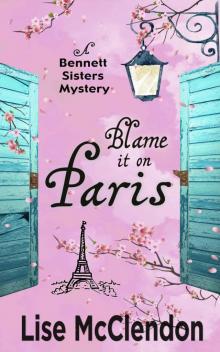 Blame it on Paris (Bennett Sisters Mysteries Book 7)
Blame it on Paris (Bennett Sisters Mysteries Book 7)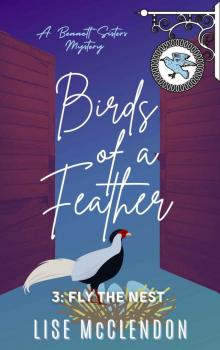 Birds of a Feather: 3: Fly the Nest (Bennett Sisters Mysteries Book 16)
Birds of a Feather: 3: Fly the Nest (Bennett Sisters Mysteries Book 16)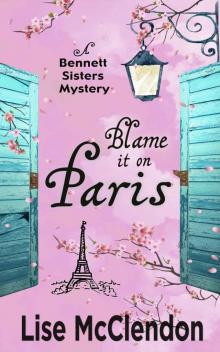 Blame it on Paris
Blame it on Paris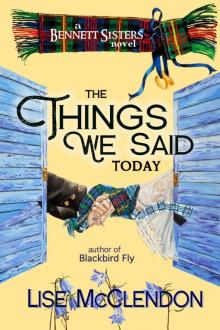 The Things We Said Today
The Things We Said Today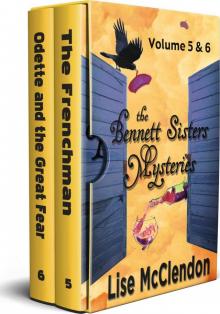 Bennett Sisters Mysteries Volume 5 & 6
Bennett Sisters Mysteries Volume 5 & 6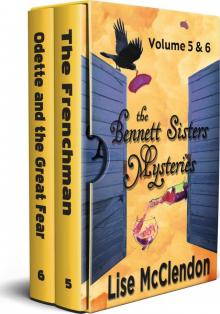 Bennett Sisters Mysteries Box Set 2
Bennett Sisters Mysteries Box Set 2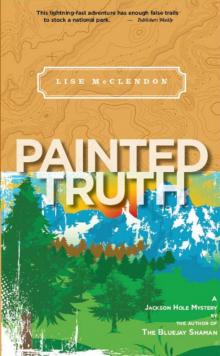 Painted Truth
Painted Truth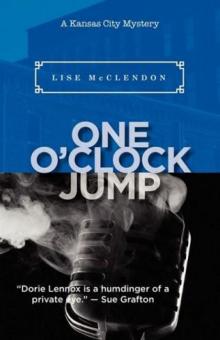 One O'Clock Jump
One O'Clock Jump The Bluejay Shaman (Alix Thorssen Mystery Series)
The Bluejay Shaman (Alix Thorssen Mystery Series)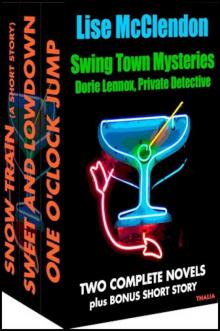 Swing Town Mysteries Dorie Lennox Box Set
Swing Town Mysteries Dorie Lennox Box Set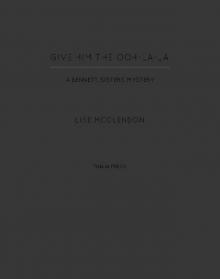 Give Him the Ooh-la-la
Give Him the Ooh-la-la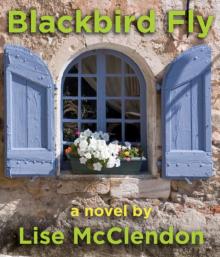 Blackbird Fly
Blackbird Fly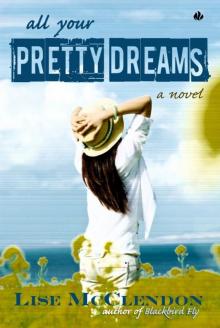 All Your Pretty Dreams
All Your Pretty Dreams Nordic Nights (The Alix Thorssen Mysteries)
Nordic Nights (The Alix Thorssen Mysteries)